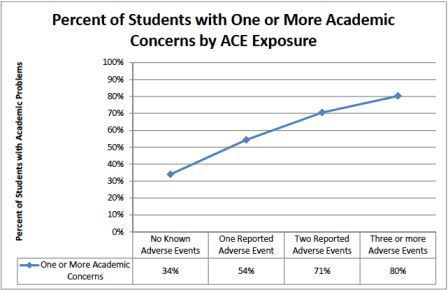Give Your Support
ACEs in Education
Toxic stress brought on by complex trauma can harm the developing brain of a child, which may in turn contribute to behavioral and academic problems by the time a child reaches school age. One large influential study conducted in Spokane, Washington, found elevated ACE Scores among schoolchildren facing challenges in the classroom (see graph below).
Researchers of the Spokane study, recognizing the implications of these findings, shared their results with local stakeholders who promptly took action. Cross-system collaboration subsequently led to the planning and implementation of a project which, in part, aimed to train teachers on effective methods of working with traumatized children and their parents (read more about the Spokane study and the project here).
ACE awareness is growing in schools around the United States.
Teachers, school administrators, parents, and others within and beyond the education sector are teaming up to create healthy and supportive school environments that promote the academic success of all students. Schools like Cherokee Point Elementary School in San Diego, California and Lincoln High School in Walla Walla, Washington are applying trauma-informed methods to help make their kids feel safe, connected, and ready to learn.
There are a lot of school-based trauma-informed approaches out there and not all of them were made just for mental health professionals to use. With the right training, some of these approaches can be carried out by teachers or school aides as well. The following are some of the school-based interventions currently supported by research to help students get the support they need to recover from trauma and succeed:
- Cognitive Behavioral Intervention for Trauma in Schools (CBITS)
- Positive Behavioral Interventions and Supports (PBIS)
- Attachment, Regulation and Competency (ARC)
- Support for Students Exposed to Trauma (SSET)
Effective school ACE Response focuses on ways to support students' healthy biopsychosocial development. The Whole School, Whole Community, Whole Child (WSCC) model is a collaborative approach developed by the Centers for Disease Control and Prevention (CDC) and ASCD that holistically addresses the connection between students' learning and health. Restorative Integral Support (RIS) could aid in the implementation of WSCC and other school-based approaches.
Resources for Educators
-
ACEs in Education ACEs Connection Group - Join this growing online social networking group of ACE advocates coming together from far and wide to learn and share ways of addressing ACEs in education.
-
Child Trauma Toolkit for Educators - Learn what the common signs of traumatic stress look like at different ages and what you can do to help by reviewing this toolkit developed by the National Child Traumatic Stress Network (NCTSN). The toolkit also offers helpful self-care tips for educators.
-
Inside the Collaborative Classroom - Academic success goes hand in hand with social and emotional learning. Such is the main philosophy driving the Center for the Collaborative Classroom, creator of this handy site, which contains a multitude of tools and resources designed to help teachers build their students' strengths in the classroom.
-
Notes on a Holistic Framework for Teaching, Learning, Agency, Healthy Development & School Success - This PowerPoint presentation, compiled by Hal A. Lawson, PhD, overviews a holistic framework for healthy youth development, learning, and educational success. Key factors leading to young adult success are highlighted. The presentation also offers key questions for youth, educators, parents, and youth service providers to ask about how the biopsychosocial needs of young people are being addressed in their communities.
-
Trauma and Learning Policy Initiative (TLPI) - Visit the TLPI website for additional resources and information related to trauma in schools. TLPI is a collaboration of Massachusetts Advocates for Children and Harvard Law School. The collaborative engages in a number of activities aiming to promote the academic success and wellbeing of students who have been exposed to ACEs.
-
Webinar: Trauma Sensitive Schools - This 1-hour webinar produced by NYSUT looks at the latest research on trauma among school children, exploring trauma's prevalence and impact on childrens' behavior, relationships, and learning. Elements of a trauma sensitive school approach are offered along with resources for implementation. Scroll down the linked page to find additional NYSUT webinars pertaining to health and safety in schools.


